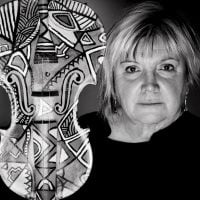View this post on Instagram
I heard a whimper.
Looking up, I saw the confusion on the student’s face and realized the sound had come from me.
I was looking through the shelves for a piece of music, but every book I took out brought more pain. The pages became caught in the splits in my fingers. The splits were wide, deep, angry. And, oh, how they hurt!
I had a vision, for a moment, of a future in which I couldn’t use my hands at all. I couldn’t play. I couldn’t demonstrate anything to students. I couldn’t cook. I couldn’t dress myself properly. I couldn’t even wash my hands after going to the bathroom because getting water in the splits was unthinkable.
How would I live? What would be left for me to do? It was only momentary; I gritted my teeth and carried on looking through the music. The student went home, and I went upstairs to contemplate my future.
I didn’t really realise anything was wrong. It was the climate, I reasoned. Lots of people’s fingers split in winter. Come summer, and they’d be fully functioning again—musician’s fingers: athletic, precise, skilled. Meanwhile, I’d tape them up and keep going.
Then came the diagnosis. First, Mycosis Fungoides later amended to Sezary Syndrome. No cure.
“Was this what caused my fingers to split?” I asked.
“Yes,” they said.
That momentary vision in the studio acquired a scary reality. Who would I be without my hands? My independence, my livelihood, my very self, all gone.
I’d never given my hands much thought until that day. I relied on them and just assumed they’d always be there for me, like every other part of my body. But this was no mere temporary injury. This was permanent. The questioning was relentless:
Who am I? Oh yes, I’m a person with a disability.
Who am I? Oh yes, I’m that person who can’t do anything for herself.
Who am I? Oh yes, I’m that weird woman who wears white gloves all the time.
Who am I? No idea.
I wasn’t Jo anymore. I had a new identity of sorts: cancer patient. I no longer had a name; I was just a set of symptoms, an inconvenient person who needed help with everything.
No!
I didn’t know how to live like that. I didn’t know how to be disabled.
My mother had endured ever-increasing disabilities until she died. Although I looked on and sympathized, I had no personal experience of ongoing incapacity. There was no one to do things for me. It was just me and the cat (and he couldn’t really help).
As before, I taped up my fingers and kept going. Then my feet started to split…
In the mornings, it took me five excruciating minutes to hobble to the bathroom. I thought twice about every outing. Was it worth the pain? The effort? I was so slow. The simplest task seemed to take forever. I looked and felt like an old lady of 90.
More importantly, I had a wardrobe full of fabulous shoes I could no longer wear.
Even more sedentary than usual, the old cliché replayed in my head on a permanent loop. An insidious whisper whose only purpose was to terrify:
“If you don’t use it, you lose it. If you don’t use it, you lose it. If you don’t…”
With the help of my doctor, I applied for a disabled permit for my car. The day it arrived, hope and horror warred within me.
Hope: that being able to park so close to my favourite haunts would mean life could return to some semblance of normality.
Horror: that this permit somehow labelled me more than my physical difficulties ever had. It was unequivocal. Permanent. Final. It offered an identity I wanted with all my heart to reject.
Belatedly, I understood why my mother had kept her permit on the kitchen table.
Aside from the inconvenience and the loss of my sense of self, disability was embarrassing. At restaurants, I had to ask someone else to squeeze my lemon.
On crowded pavements, I slowed the progress of all the busy people hurrying about their days. At work, I looked ridiculous playing the viola with Band-Aids on all my fingers.
What must it sound like? And, oh, how amateur!
Slowly, slowly it dawned on me that the judgements were all mine. No one was looking at me with disdain, contempt, or ridicule. Surprisingly, what I got from most people was admiration. I didn’t think I deserved it, but it comforted me nevertheless.
Medicine is wonderful. For now, my hands and feet are mostly fine. Occasionally they flare up—a stern reminder not to take them for granted.
People talk about my “wonderful attitude” as if it is cause for congratulation. As if I set out to become this amazing human being who could move mountains and turn water into wine (I wish).
It’s all bollocks. I don’t have “an attitude.” I simply deal with stuff that happens in the only way I know how.
Most of us do that. And most of us discover unsuspected reserves of strength along the way.
This strength stays with us and, like a bank account, builds up until we need to draw on it. Unlike a bank account, drawing on it doesn’t delete it but rather builds it up even further. The opposite of “if you don’t use it, you lose it.”
What a win?!










Read 10 comments and reply